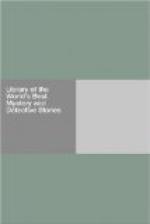Setoc laughed to see all his slaves walking with their bodies inclined. Zadig took the liberty to explain to him the cause, and inform him of the laws of the balance. The merchant was astonished, and began to regard him with other eyes. Zadig, finding he had raised his curiosity, increased it still further by acquainting him with many things that related to commerce, the specific gravity of metals, and commodities under an equal bulk; the properties of several useful animals; and the means of rendering those useful that are not naturally so. At last Setoc began to consider Zadig as a sage, and preferred him to his companion, whom he had formerly so much esteemed. He treated him well and had no cause to repent of his kindness.
THE STONE
As soon as Setoc arrived among his own tribe he demanded the payment of five hundred ounces of silver, which he had lent to a Jew in presence of two witnesses; but as the witnesses were dead, and the debt could not be proved, the Hebrew appropriated the merchant’s money to himself, and piously thanked God for putting it in his power to cheat an Arabian. Setoc imparted this troublesome affair to Zadig, who was now become his counsel.
“In what place,” said Zadig, “didst thou lend the five hundred ounces to this infidel?”
“Upon a large stone,” replied the merchant, “that lies near Mount Oreb.”
“What is the character of thy debtor?” said Zadig.
“That of a knave,” returned Setoc.
“But I ask thee whether he is lively or phlegmatic, cautious or imprudent?”
“He is, of all bad payers,” said Setoc, “the most lively fellow I ever knew.”
“Well,” resumed Zadig, “allow me to plead thy cause.” In effect Zadig, having summoned the Jew to the tribunal, addressed the judge in the following terms: “Pillow of the throne of equity, I come to demand of this man, in the name of my master, five hundred ounces of silver, which he refuses to pay.”
“Hast thou any witnesses?” said the judge.
“No, they are dead; but there remains a large stone upon which the money was counted; and if it please thy grandeur to order the stone to be sought for, I hope that it will bear witness. The Hebrew and I will tarry here till the stone arrives; I will send for it at my master’s expense.”
“With all my heart,” replied the judge, and immediately applied himself to the discussion of other affairs.
When the court was going to break up, the judge said to Zadig, “Well, friend, is not thy stone come yet?”
The Hebrew replied with a smile, “Thy grandeur may stay here till the morrow, and after all not see the stone. It is more than six miles from hence; and it would require fifteen men to move it.”
“Well,” cried Zadig, “did not I say that the stone would bear witness? Since this man knows where it is, he thereby confesses that it was upon it that the money was counted.” The Hebrew was disconcerted, and was soon after obliged to confess the truth. The judge ordered him to be fastened to the stone, without meat or drink, till he should restore the five hundred ounces, which were soon after paid.




